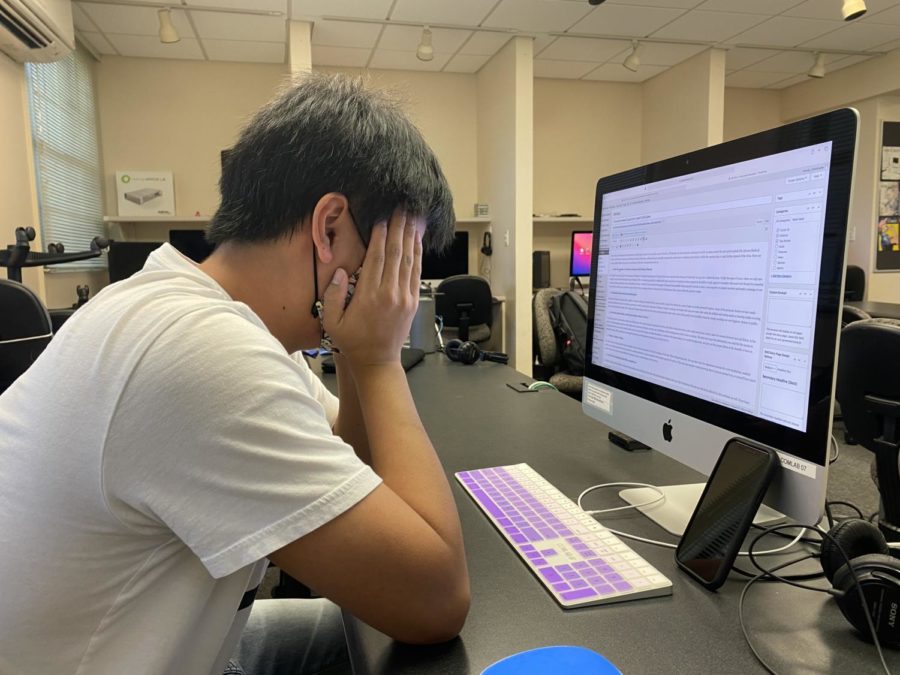Anxiety in College: 5 Ways to Cope
Gavin Bedoya, a senior at Chaminade, participates in self-care activities to relieve stress and anxiety from his classes.
Feeling nervous, restless, or tense? Having a sense of impending danger, panic, or doom? According to mayoclinic.org, these are common anxiety signs and symptoms and these often spike during college.
College is a unique time in one’s life to experience independence, meet new people, and explore new interests. Yet, for many, facing new challenges and changes can be stressful and overwhelming. According to the American College Health Association Fall 2018 National College Health Assessment, 63% of college students in the U.S. experienced anxiety.
Being a fifth-year undergraduate, I have dealt with anxiety throughout my academic and athletic career. I sought out professional help through the Chaminade University counseling services. There is no shame when it comes to reaching out for a help. Below is a list of five ways that I’ve found to be helpful to cope with college-related anxiety.
Approach Rather Than Avoid
College comes with difficulties like changes in academic standards or financial pressures. Students might manage their negative feelings by avoiding stressors such as skipping class or staying in bed all day. Avoidance tends to exacerbate anxiety over time. Instead, try approaching anxiety-provoking situations in modest stages. Having trouble in class? Consider emailing the professor or a counselor for assistance. Feeling lonely? Try joining clubs, volunteering on campus or at school events, or seeking friends who share similar interests and core values.
Create a Comfortable Environment
After a long day, being able to retreat back to a space that is pleasant and feels like home can make a world of a difference to an anxious mind. The way your environment is arranged, whether it be a dorm or apartment, can help with sleep and possibly alleviate homesickness. Some tips on creating a relaxing and comfortable environment are to display photos and other objects that spark joy and bring back memories of home or pleasant times, set up a separate workplace from your chill zone, clean and declutter your space, and fill your small fridge with a variety of your favorite nutritious food.
Practice Self-Care
Without the framework of home, many students struggle to maintain good eating habits, consistent exercise, and regular sleep. However, self-care practices such as these are critical for mood regulation and stress management. Make an effort to develop your own self-care regimen. According to helpguide.org, exercise is a safe and effective natural anti-anxiety therapy. It reduces tension and stress, increases physical and mental vitality, and improves overall well-being through releasing endorphins. I always make time to fit in a workout during my hectic schedule. When I’m having a rough mental health day, I go for a run by Diamond Head at sunset because I know that I’ll feel better after.
Keep a Journal
Journaling is the act of writing down your personal thoughts, feelings, or ideas. It can be written, illustrated, or typed. It can be done on paper or on a computer and it’s an easy, low-cost approach to improve mental health. Writing about an emotional incident can assist you breaking free from the never-ending cycle of worrying over stressors. Writing down thoughts and feelings regarding a tough circumstance might help to better comprehend it. Putting an experience into words can help create fresh views about the emotionally sensitive situation. I like to journal first thing in the morning because the words that spill out on the black page no longer take up space in my brain and I can approach the day with more clarity.
Reach out to Resources on Campus
Chaminade offers 10 sessions of counseling free of charge during a student’s academic career. Students must be actively enrolled full-time and part-time as an undergraduate or graduate student for the term they are requesting counseling services for. To inquire about mental health services at CUH, email at [email protected] or call at (808) 735-4845.
